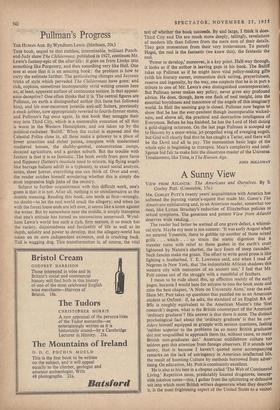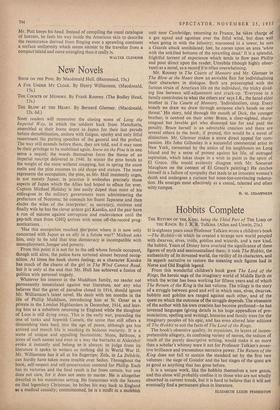A Sunny View
MR. GORLEY Purr's twenty years' acquaintance with America has softened the piercing visitor's-squint that made Mr. Gorer's The Americans exhilarating and, to an American reader, somewhat too neat, like Lytton Strachey's reduction of Elizabethan policies to sexual symptoms. The generous and patient View from Atlantis deserves wide reading.
The reader had better be warned of one grave defect, a whimsi- cal style. Maybe my taste is too austere : `It was early August when we entered Yosemite, there to gobble up another of those mixed grills . . . which . . . so strain the scenic digestion that a traveler turns with relief to those gashes in the earth's crust lightened by Nature's sherbet, the lacy foam of steep cascades.' Such fancies make me groan. The effort to write good prose is like fighting a featherbed, T. E. Lawrence said, and when I read of Negroes in New York, that `the indomitable African shadows this western city with memories of an ancient sun,' I feel that Mr. Putt comes out of the struggle with a mouthful of feathers.
I mean to be rude about this, an affliction mainly of the early pages, because I would hate for anyone to toss the book aside and miss the best chapter, 'A Note on University Aims,' near the end. Here Mr. Putt takes up questions that puzzled me as an American student at Oxford : if, he asks, the standard of an English BA or BSc is roughly equivalent to the American Master's (the 'first research') degree, what is the British counterpart of the American 'ordinary graduate'? His answer is that there is none. The distinct psychological fact about the 'ordinary graduate' is that he con- siders himself equipped to grapple'with serious questions, feeling `neither superior to the problems (as so many British graduates do) nor unqualified to approach them (as, without cause, so many British non-graduates do).' American middlebrow culture too seldom gets this attention from foreign observers. If it sounds too sunny, that is because I haven't quoted some accompanying remarks on the lack of astringency in American intellectual life, the result of boosting Culture by methods borrowed from adver- tising. On education, Mr. Putt is consistently excellent.
He is also at his best in a chapter called The Web of Continental Living.' Repetitive neon, predictably located drugstores, inescap- able jukebox tunes—this, I gather from the spluttering or defensive wit into which most British writers degenerate when they describe it, is the most frightening aspect of the United States to a visitor. Mr. Putt keeps his head. Instead of compiling the usual catalogue of horrors, he feels his way inside the American skin to describe the reassurance derived from flinging over a sprawling continent a surface uniformity which seems sinister to the traveller from a compact island and more strangling than it really is.
WALTER CLEMONS



























































 Previous page
Previous page